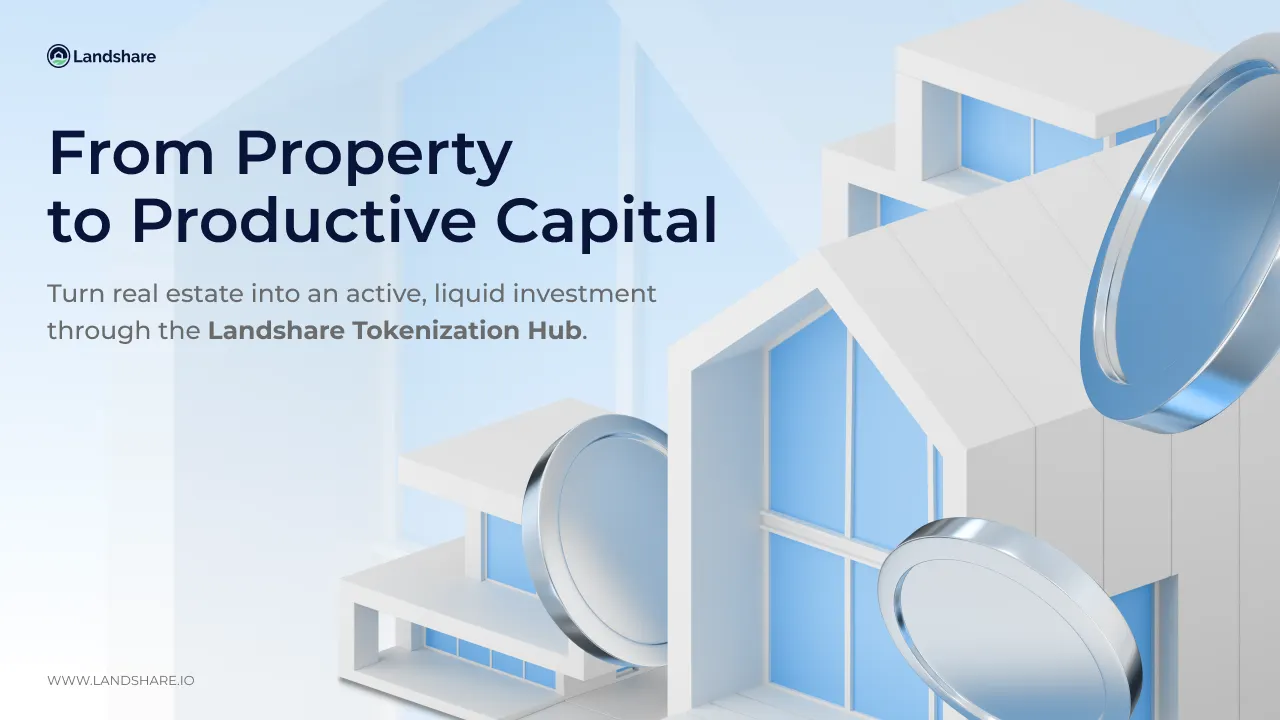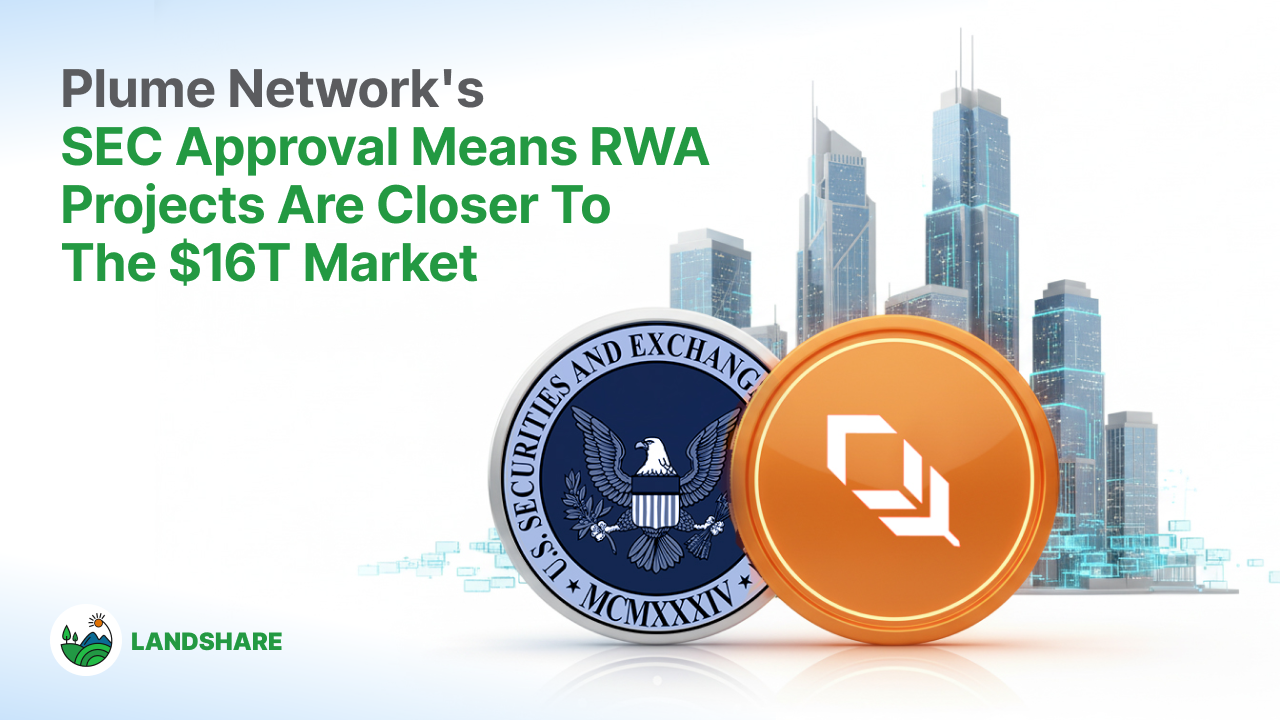Growth of Real Estate Tokenization
Landshare Team
.jpg)
The financial markets worldwide are witnessing paradigm shifts with inclusion of emerging technologies. Mckinsey report says that the new-age fintech has surged from the periphery to dominate financial services, with its market cap hitting $550 billion by July 2023, and the number of fintech unicorns reaching 272, valued at $936 billion. This growth, driven by innovation, digitization, and changing consumer demands, has seen fintech reshape financial services.
We look at traditional investment sectors such as real estate and commodities markets that are also poised for transformation. One of the technological advancements that emerged recently is tokenization.
The global real estate market is valued in trillions of dollars, yet it's characterized by low liquidity and high entry barriers. Tokenization is poised to unlock the value of illiquid assets and make them accessible to a wider range of investors.
For the real estate market which is worth a whopping $600 Trillion as of now, tokenization is a game changer that can contribute to the sector’s growth and eliminate inefficiencies to a large extent. Several cryptocurrency projects, such as Landshare ($LAND), have also emerged in the past several years dedicated to the tokenization of the real estate sector.
Let’s dive deeper into the subject and try to understand what is on the other side of the innovative intersection of real estate and blockchain technology and how Landshare-like platforms play a crucial role in achieving success.
What is Tokenization?
Tokenization is a process of issuing a digital representation of an asset over a blockchain. The process ensures digital representation of tangible financial assets over blockchain. A tokenized version of a physical asset does not only keep the inherent traits but also eliminate the shortcomings.
The process of tokenization includes token issuance, sale of the token, and then custody of the security token. However, the process of ownership includes asset’s going through tokenization which is then divided into a certain number of tokens where each token represents a percentage of the property possession.
The market size of tokenization was $2.3 Billion by 2021 but the sector is likely to see significant growth in the future given the expected compounded annual growth rate (CAGR) of 19%. The market size could swell up to $5.6 Billion by 2026.

In terms of real estate tokenization, any property can be converted into security tokens over blockchain. These tokens would now represent the value of a unit of real estate property. The popular term for such tokens is Real World Asset (RWA) tokens.
Traditionally, the buying and selling of real estate properties comes with much of a hassle. First up it requires a hefty amount of upfront capital to buy the asset. It takes a lot of time and effort to do paperwork for the property handover. The process is not transparent and there’s always a scope of oversight. Also, there are a lot of constraints for a buyer willing to buy a foreign property.
How Does Tokenization Ease Real Estate Investment?
Tokenization of the real estate market brings unprecedented advantages for one of the biggest investment sectors in the world. Real estate investments are among the few investments with lucrative yet stable returns. The tokenized version brings additional features making it even more attractive.
- Liquidity Made Possible: Real estate is known for its illiquidity, as buying and selling properties can take months. Tokenization of real estate allows the properties to be divided into digital shares, or RWA tokens. These tokens then further can be traded much like stocks on an exchange resulting in enhancing liquidity.
- High Entry Barrier: Traditional real estate investments often require significant capital. This used to limit access to wealthy individuals or institutional investors. Tokenization lowers the entry barrier, allowing investors to buy real-estate backed RWA tokens representing fractional ownership at a much lower cost.
- Enhanced Transparency and Security: The blockchain is an immutable ledger which ensures transparency, security, and tamper-proofing of all the transactions. This reduces the possibility of fraud to a large extent and increases trust among investors. Whole property transactions and procedures are stored on this ledger.
- Access to International Real Estate Assets: One of the significant advantages by tokenization of real estate is giving buyers global access. Tokenization enables investors from around the world to invest in real estate markets around the world without the complexities of cross-border transactions. This, as a result, broadens investment opportunities and diversification.
- Efficiency and Increased Speed: Inclusion of blockchain brings the ability to use smart contracts-like features which helps in automating the transactions like operations. Tokenization streamlines the buying and selling process, reducing the need for intermediaries, lowering transaction costs, and increasing the speed of transactions. This can be done using smart contracts that are executed automatically once all the conditions are met.
- Fractional Ownership: The revolutionary change because of tokenization comes in the form of fractional ownership. Investors can purchase fractions of property rather than prerequisite of buying it whole. It democratizes access to real estate investments and also allows for portfolio diversification even with limited capital.
- Improved Asset Management: Tokenization can facilitate easier and more efficient management of real estate assets. Blockchain based smart contracts can take care of operations from leasing to maintenance.
Differences Between Traditional and Tokenized Real Estate Investments
Tokenized real estate investments are different from traditional real estate investments. However, the differences do not make any one of them superior then the other. Instead, the tokenized real estate is only going to complement the traditional sector. The comparison between the two should clear the picture to a large extent for better understanding.
Challenges In Front of Real Estate Tokenization
Though tokenization has noteworthy benefits, there are several challenges in front of the growing sector that needs to be addressed.
Regulatory compliance becomes one of the hurdles in front of real estate tokenization. Since it's an emerging market, the regulatory bodies across the countries might still need some time to come up with regulations to keep the scrutiny without compromising on the sector's growth.
Akin to regulatory compliance, the newness of the tokenized real estate market makes it relatively tough for people to accept. The financial markets are still figuring out and may take time to completely trust and accept the new investment vehicle.
Growth Potential of Tokenized Real Estate Market
The global real estate market is expected to hit a staggering value of $637.8 Trillion in 2024. The projected annual growth rate is 3.4% CAGR. And considering the expected growth rate, the real estate market is going to be worth $729.4 Trillion by 2028.
A report by the World Economic Forum predicted that by 2027, 10% of the world's GDP will be tokenized — with a significant portion of this potentially in the real estate sector. To put this into perspective, world GDP in 2027 is expected to hit $130 Trillion and hence the tokenized asset market will be worth around $13 Trillion. This number suggests a huge growth potential for the tokenized market in the coming years.

Landshare’s Unique Approach to RWA Investment
The Landshare Ecosystem takes a unique approach to tokenized real estate, combining the benefits of RWA investment with the opportunities provided by DeFi features such as staking and LP Farming.
Our approach to the real estate tokenization market is underscored by our unique selling propositions, reflecting both innovation and reliability. The successful sale of three properties on the Binance Smart Chain (BSC) serves as a concrete demonstration of our operational capabilities and market acceptance.
Furthermore, the launch of our Real World Asset (RWA) token, Landshare RWA ($LSRWA), introduces new avenues for investors seeking diversification and passive income. RWA tokens represent a pool of properties for you to invest in at once, reducing risk through diversification.
For instance, we acquire a real estate property in Cleveland for $118,000 and add the asset to the RWA Pool. Each RWA Token represents a share of the total pool, providing a clear and tangible stake in the investment.

Our native utility token, $LAND, plays a crucial role in transactions and operations across the platform.
In addition to the core advantages of tokenized real estate, we bring forth extra features for DeFi-centric users. By staking the $LAND token, investors can earn 12% APR, while engaging in staking with $LAND-$BNB LP presents the potential for rewards up to 66%.
Conclusion
The financial markets are undergoing a transformative shift with the advent of technologies like blockchain, particularly in the real estate sector. Landshare and similar platforms are at the forefront, merging blockchain with real estate to enhance accessibility, efficiency, and transparency.
Tokenization is revolutionizing investment by making real estate more accessible and liquid, signaling a future where investing in tangible assets is more democratized. We, at Landshare, are playing our role in this evolution, demonstrating the potential of tokenized real estate and its significant economic implications. This movement isn't just a trend but a pivotal change set to redefine investment landscapes globally.
Landshare October Recap
Landshare Team
October was a milestone month for Landshare – one that set the stage for the next era of on-chain real estate. From the official Landshare v2 announcement to new ecosystem updates, governance decisions, and exciting community initiatives, we’ve laid the groundwork for a future defined by growth, utility, and innovation.
This month, we introduced the framework that will redefine how investors, property owners, and DeFi users interact with real estate on-chain. Let’s recap the highlights 👇
Landshare v2 Announcement
The official unveiling of Landshare v2 signaled the start of a new chapter – one built around real utility, real yield, and real scalability.
Landshare v2 isn’t just an upgrade. It’s the foundation of a self-sustaining ecosystem where tokenized real estate finally reaches its full potential. The new system transforms stable assets into active yield-generating opportunities, seamlessly connecting traditional markets to DeFi.
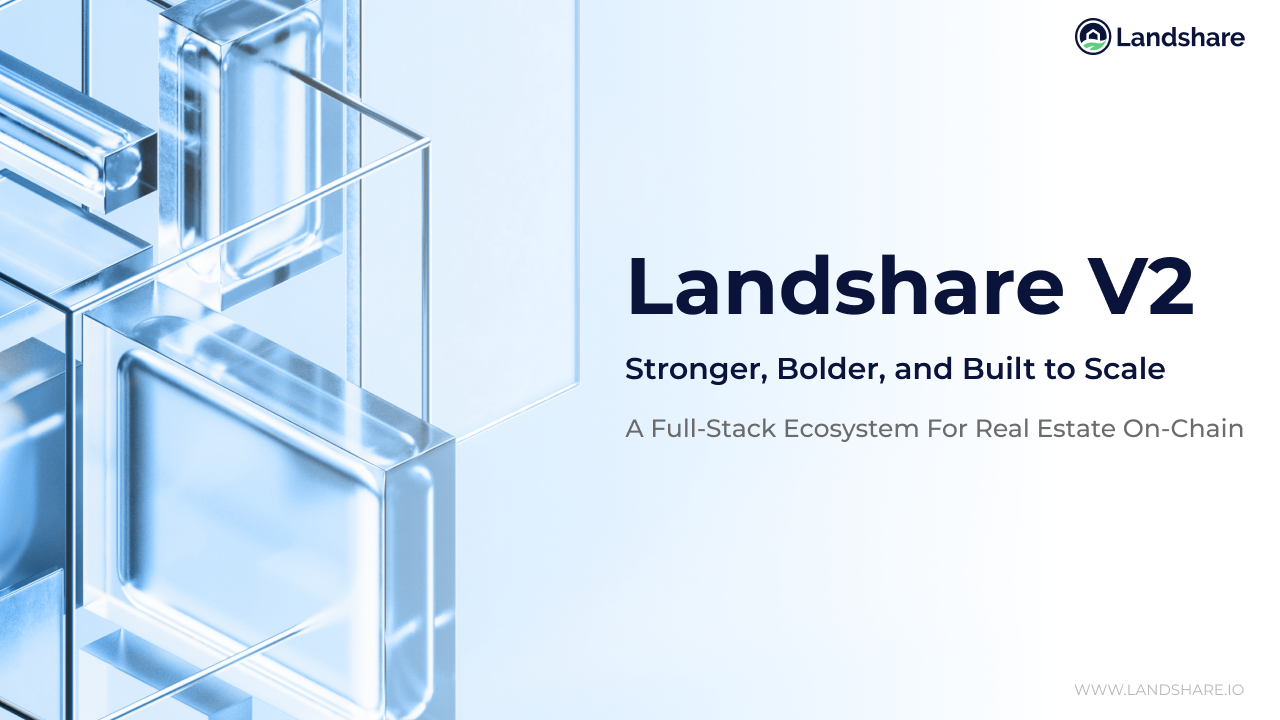
The Three Pillars of Landshare v2
In our follow-up deep dive, we explored the three core pillars that form the foundation of Landshare v2:
- The Real Asset Vault (RAV): A seamless gateway for stablecoin holders to earn real yield backed by tokenized properties.
- The Tokenization Hub: A complete solution for property owners to bring their assets on-chain.
- The DeFi Suite: Tools and incentives that amplify participation and utility across the ecosystem.
Together, these pillars create a self-sustaining growth loop, where every user and property strengthens the entire network.
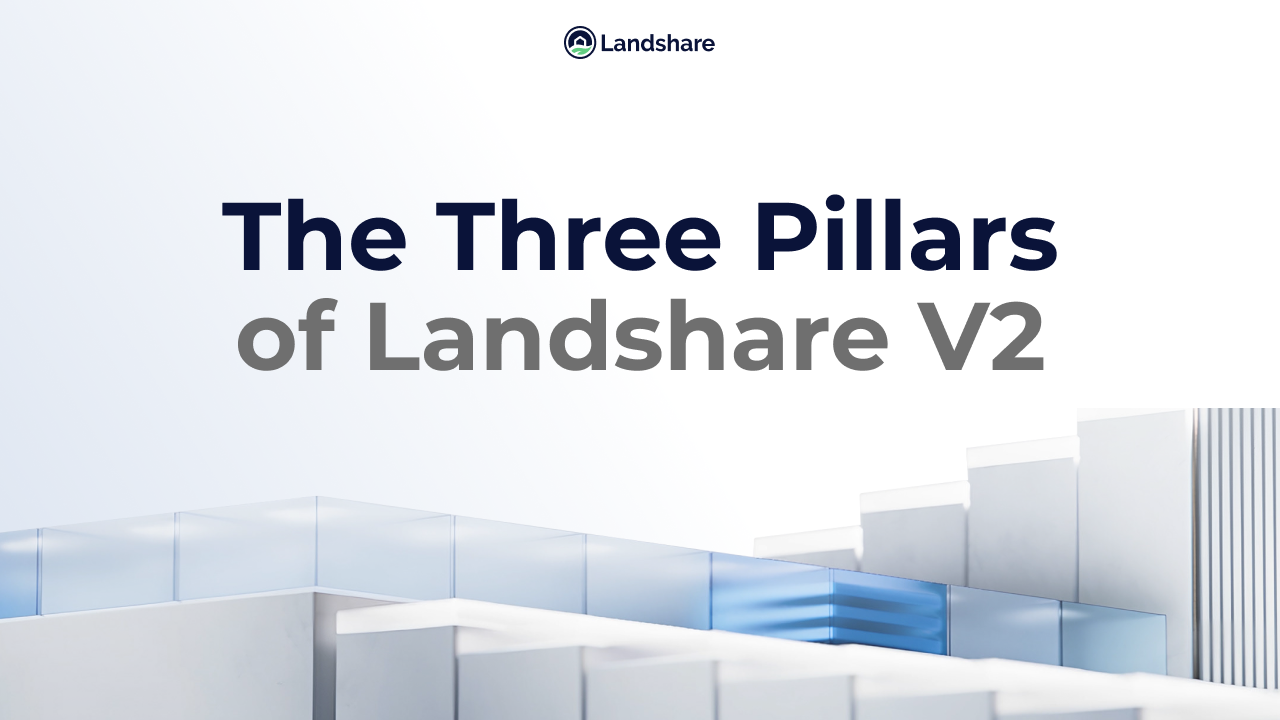
DAO Proposal Passed
In late October, the community voted to reduce LP emissions by 50% across both the LAND–BNB and LSRWA–USDT pools – with the proposal passing at 62.28% in favor.
This important step helps:
✅ Reduce daily LAND inflation
✅ Strengthen token scarcity and price stability
✅ Extend the reward pool lifespan
✅ Encourage long-term liquidity participation
The change will take effect within 48 hours of approval and marks another move toward a more balanced, sustainable economy for Landshare v2.
🗳️ View the full proposal and results
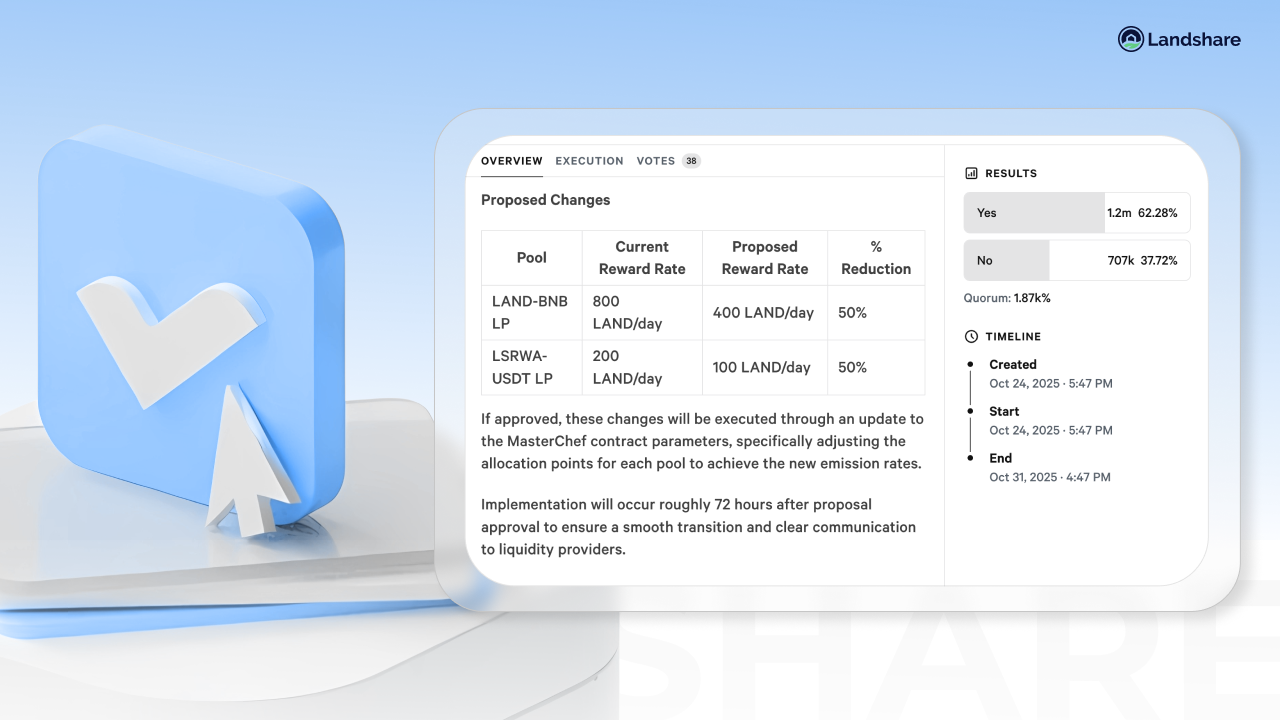
Tokenization Hub Breakdown
We released a comprehensive guide to the Landshare Tokenization Hub, explaining how property owners can now go beyond simple tokenization to access real investors, liquidity, and on-chain utility.
The Hub bridges traditional real estate with blockchain finance – creating a pathway for real-world assets to generate ongoing yield, transparency, and accessibility.

4.5M+ LAND Staked
October also marked another key milestone – over 4.5 million LAND tokens (nearly half of the total supply) are now staked in vaults. This incredible community achievement reflects growing confidence in Landshare’s long-term vision and token utility.
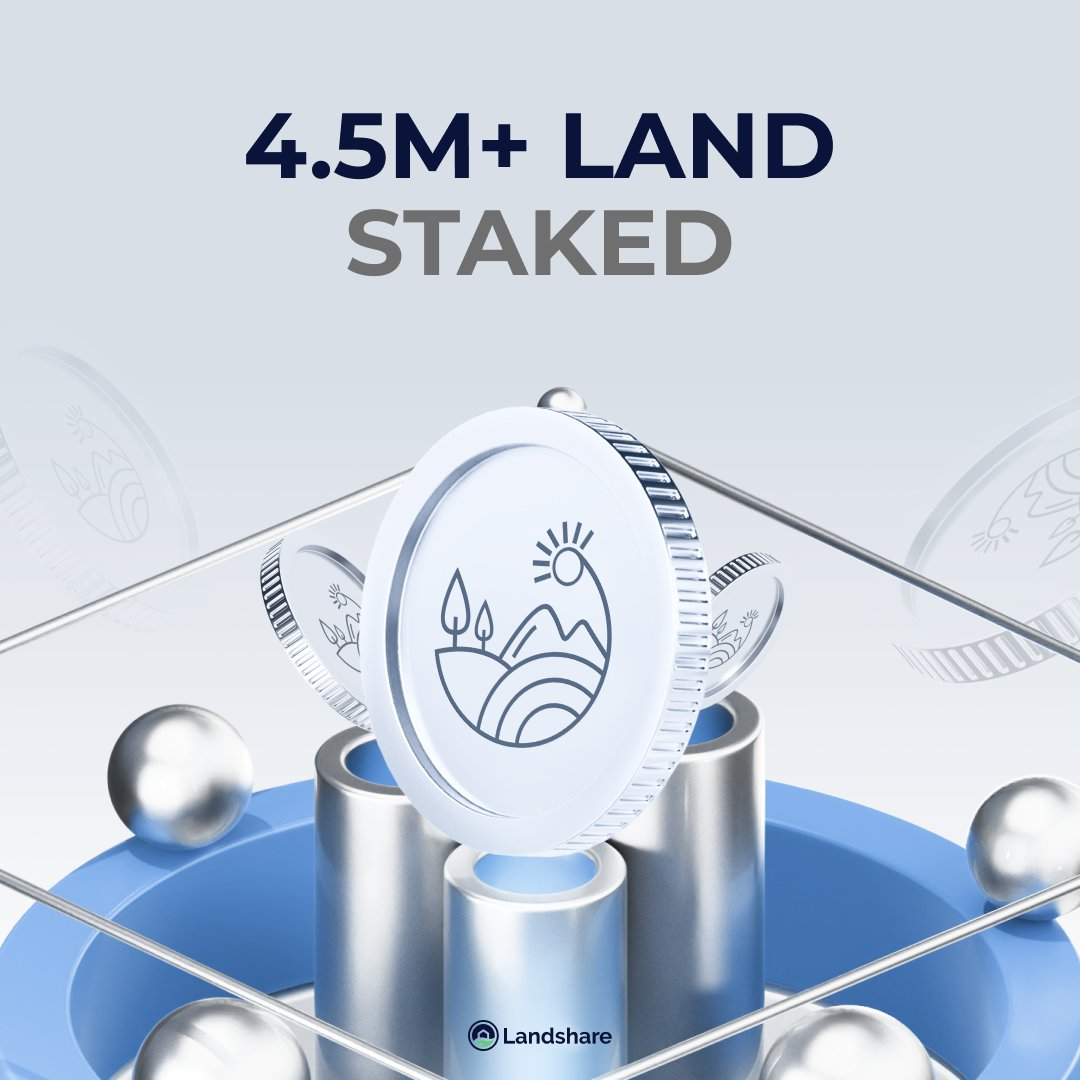
Community Townhall Incoming
We’re excited to announce our next Community Townhall, happening Thursday, November 6 at 12 PM CST or 6 PM CET on X Spaces!
Join Jordan (CEO), Travis (Co-Founder), and Ivan (CMO) as they discuss everything happening with Landshare v2, recent DAO proposals, and take your questions live.
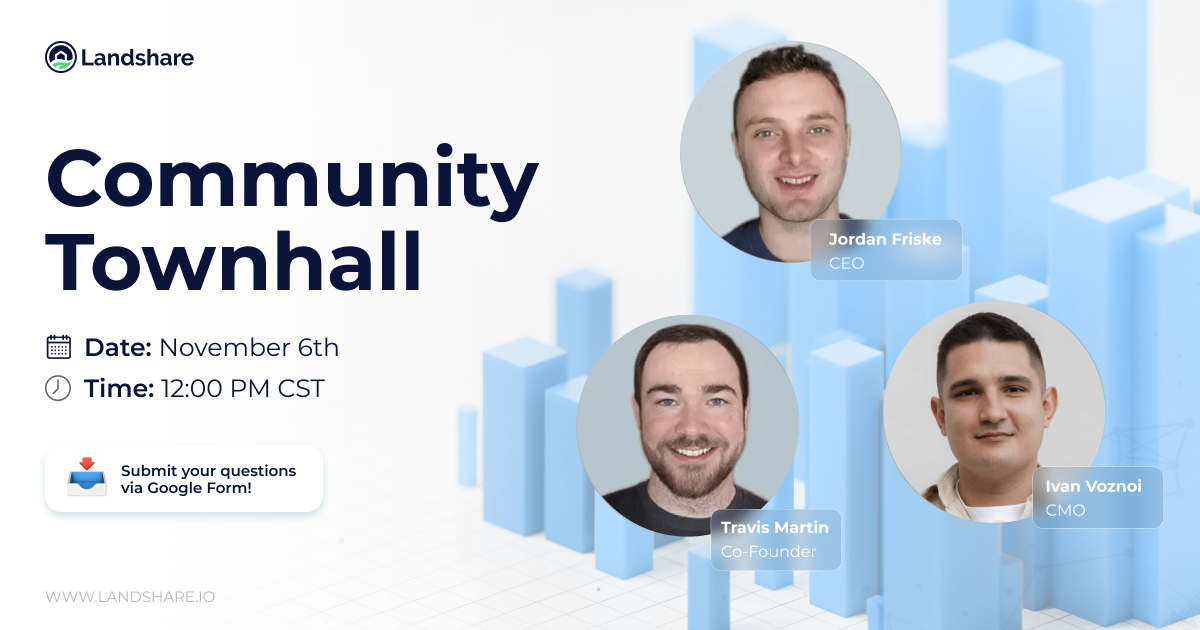
Looking Ahead
With Landshare v2 on the horizon, the foundation is set for a new phase of growth and adoption. In the coming weeks, we’ll be sharing more details on the RAV launch, the Points Campaign, and other major milestones driving our ecosystem forward.
Stay tuned – the future of real estate is being built on-chain, and we’re just getting started.
Tokenization Hub Breakdown
Landshare Team
Real estate tokenization has been a buzzword for years. Yet in practice, most projects have failed to move beyond press releases and empty promises. Too often, blockchain has been used as a veneer to package illiquid or low-quality assets, leaving investors with tokens that serve little purpose and property owners with no meaningful results.
Without investors, liquidity, or secondary markets, tokenization becomes little more than an on-chain spreadsheet — a digital record of ownership that no one can trade or invest in. For property owners, that means time and money spent “tokenizing” without achieving key goals: raising capital, expanding visibility, or unlocking value.
A Smarter Path Forward
For real estate tokenization to truly work, it needs to deliver tangible investment outcomes. After years of building and refining on-chain real estate products, Landshare has developed a model designed to do exactly that.
The Landshare Tokenization Hub transforms tokenization from a passive concept into an active investment process — connecting high-quality properties with real investors, liquidity pathways, and a live blockchain economy.
The Tokenization Hub Solution
Most platforms stop once a token is created. Landshare’s Tokenization Hub goes further , offering a complete pathway for property owners to bring their assets on-chain and immediately engage investors.
Each project is structured for success from day one, with:
- Customized tokenization models tailored to each property
- Transparent fundraising mechanics with defined soft and hard caps
- Built-in integration with the broader Landshare ecosystem
By connecting directly to Landshare’s existing network of investors and DeFi infrastructure, offerings can attract participation as soon as they launch. Once a fundraising goal is met, property tokens are deposited into the Landshare RWA Pool, linking them to ongoing liquidity, yield mechanisms, and secondary market exposure.
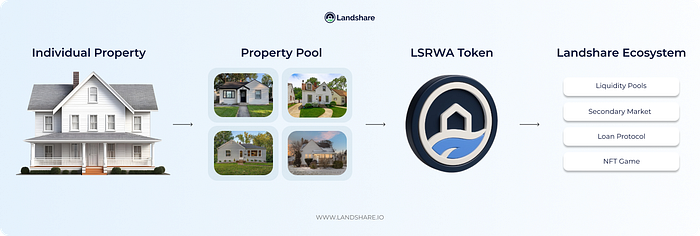
Why This Model Delivers Real Results
Where others leave property owners to manage marketing, compliance, and liquidity alone, the Tokenization Hub handles these as part of a unified process. This integration dramatically increases the likelihood of meeting fundraising goals and sustaining long-term engagement.
Integration with the Landshare RWA Token (LSRWA) is central to this model. Rather than isolated tokens with no market, each property becomes part of a shared, liquid environment that generates yield and investor participation. Individual assets can still be represented, extracted, or traded independently when needed.
For example, a multifamily property owner might tokenize 20% equity to raise $500,000 on-chain, connect the asset to the RWA Pool for ongoing yield, and maintain full transparency for investors — all within a compliant, accessible framework.
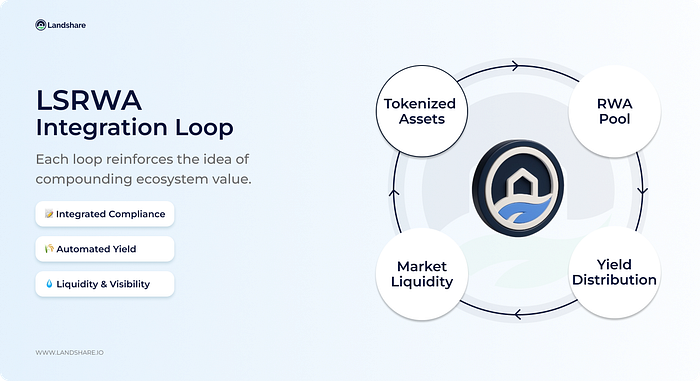
How It Works
- Tokenize the Property: Landshare collaborates with property owners to create a digital representation of equity, income rights, or hybrid participation.
- Launch the Offering: The property is listed on the Tokenization Hub with defined terms, caps, and transparent investor access.
- Fundraising & Validation: Investors participate directly on-chain. Once the soft cap is reached, funds are secured and the offering is finalized.
- Ecosystem Integration: Tokens are deposited into the Landshare RWA Pool, and investors receive LSRWA tokens representing pooled value and yield potential.
- Ongoing Value Creation: Property owners gain lasting benefits through liquidity, visibility, and investor engagement. As new assets are added to the pool, owners can rebalance between equity and cash, making real estate a more dynamic and liquid asset than ever before.

Built for Real-World Impact
The Landshare Tokenization Hub is more than a technical service — it’s a complete ecosystem designed to make real estate investment active, liquid, and accessible.
For property owners, it offers a streamlined way to raise capital and connect with global investors.
For investors, it provides exposure to yield-generating, on-chain assets backed by transparent real-world value.
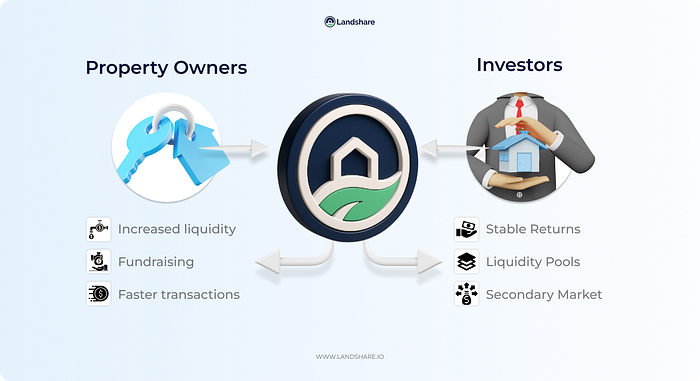
In an industry crowded with static tokens and overhyped promises, the Tokenization Hub delivers what tokenization was always meant to achieve — real outcomes, real liquidity, and real-world results.
🏡 About Landshare
Landshare is a tokenized real estate ecosystem that enables seamless investment in real-world assets on the blockchain. With Landshare, you can own a share of a real-world property simply by holding our RWA Tokens ($LSRWA). Our platform offers a secure, transparent, and efficient way to invest in real estate without traditional barriers.
- Website: landshare.io
- Twitter: @Landshareio
- Community: t.me/landshare
Plume Network's SEC Approval Means RWA Projects Are Closer to the $16T Market
Landshare Team
On October 6, Plume Network announced on its social media that it had been approved to be an SEC-registered transfer agent. This is a big milestone for the RWA industry, signaling that the traditional financial system is welcoming tokenized assets.
Transfer agents basically manage important back-end work and are the official record-keepers for securities issuers. So, essentially, they maintain shareholder registries, record ownership changes, issue certificates, and handle other corporate actions.
Plume’s approval means these critical functions can now be managed on-chain for tokenized securities. This is a pretty big deal, as it gives Plume and its users formal regulatory standing under U.S. law for on-chain securities.
Experts believe that this approval can boost the global RWA market, and top players like Landshare can benefit from it due to the increased regulatory clarity.
Why is the SEC’s Approval Important for Plume Network?
So, first, understand the roles of a registered transfer agent to get a better understanding of its importance.
In traditional finance, a transfer agent is usually a company or bank that tracks who owns a company’s securities and facilitates trades. They ensure every share transfer, stock split, or dividend payment is accurately recorded and reported. Now, let’s understand how this traditional role will work in the world of blockchain.
Post Link
By replicating these roles on-chain, Plume’s platform can securely log every token sale or dividend distribution in an immutable ledger, while also syncing with regulators. As Plume explains, its transfer-agent protocol will “link cap tables and reporting directly to SEC and DTCC systems”.
This means tokenized equity and debt on Plume can behave like traditional securities, but will be managed better with the help of blockchain technology.
Plume’s CEO believes that this regulation “exists to protect investors’ rights as shareholders,” and Plume’s on-chain solution is meant to simplify the processes under that framework.
Its Impact:
Experts believe that the registration will open up several doors for the RWA market because of the ‘trust factor’. Being registered means there are no risks as far as legality is concerned. When an industry or its top player receives a green flag from the government regulatory agencies, institutional capital follows.
BlackRock, Fidelity, JP Morgan, etc., are already looking to build blockchain-based products. This will further invite them to join the RWA growth story and possibly super-boost it.
Moreover, another important benefit is that tokenized securities can now flow through compliance obstacles. This means issuance times can be cut from months to weeks with the help of smart contracts. Similarly, on-chain dividends and ICOs can enjoy the same legal protections as Wall Street offerings.
What Does This Mean For The RWA Market?
Plume’s win comes at a time when analysts are already forecasting a massive growth in tokenized RWAs over the next decade. Institutions now value tokenization as a way to digitize everything from private credit to real estate. Also, the numbers are pretty optimistic as well.
A Boston Consulting Group report estimated the global asset-tokenization market could reach about $16.1 trillion by 2030. The industry has already grown by almost 380% in the past three years. To put things into perspective, today’s entire crypto market cap is smaller than those figures. Even some of the more conservative forecasts still show multi-trillion growth.
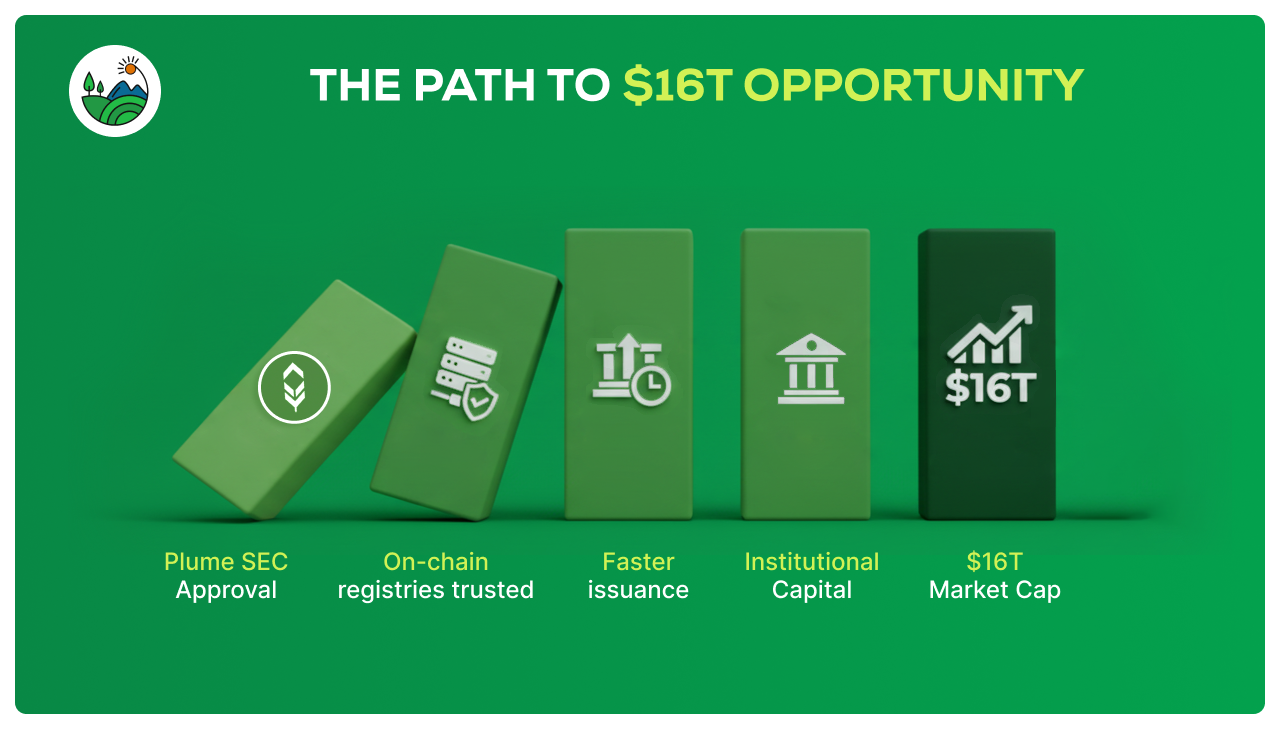
If these estimates can materialize in the days to come, RWA is well-positioned to be one of the largest markets in the world of modern finance.
Moreover, the external conditions are favoring this industry. Governments and regulators worldwide are creating proper frameworks. For instance, Asia-Pacific markets are running pilots for digital bonds and crafting standardized rules for security tokens.
These developments and the excitement of retail investors in this category build confidence that the $16T opportunity is actually very real.
How Will Landshare Benefit From This?
Landshare stands at the forefront of benefiting from this opportunity because of its early entry and real-world utility. This is very important as institutions seek new projects that have use cases that can help them capture a considerable market share.
Moreover, Landshare already operates as a compliant RWA platform. For instance, each Landshare RWA Token (LSRWA) is a security token representing fractional shares of a U.S. real estate portfolio, and buyers must pass KYC/AML checks.
The fact that regulators are now approving on-chain transfer agents shows the industry’s efforts are finally paying off. Here are some more factors that can help Landshare be one of the top RWA contenders:
1. Regulatory Credibility: Plume’s SEC status essentially means that tokenized securities can operate within established rules. Landshare’s approach aligns with these principles. So, investors can be assured that their projects sit within a legal framework designed to protect shareholders.
2. Investor Confidence: Every step toward clear regulation lifts confidence. The recently passed GENIUS Act, the SEC’s staff statements on liquid-staking, and the Trump administration’s overall outlook towards the crypto market have been fairly positive.
Similarly, Plume being approved as a SEC-registered blockchain transfer agent tells retail and institutional investors that projects like Landshare aren’t mere experiments. They’re rather a part of a regulated financial evolution.
Moreover, it means regulators see value in on-chain tokens, and that kind of signal helps legitimize the space Landshare operates in.
3. Landshare’s Own Progress: Landshare isn’t about hype. It is rather focused on delivering value from day one. The project has already sold four houses on the BNB chain. It is also providing consistent rental returns to the investors in its properties.
Moreover, the team remains focused on delivering stable, compliant returns from real estate growth.
Conclusion
So, now we know that the recent news was about more than just Plume Network being approved by the SEC to be a transfer agent. It rather has a much bigger impact on the RWA market as a whole.
While the industry continues to grow, for Landshare, it is the right time to innovate further and add more value to consumers’ lives.






